In theaters
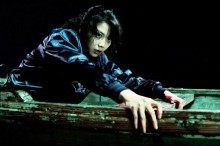
A more than usually interesting array of movies comes our way this week—including another challenge to local moviegoers to get out and support the kind of non-mainstream film I’m always being asked about. In this case, I specifically refer to Park Chan-wook’s take on the vampire film, Thirst, which opens this Friday at the Carolina Asheville. This is a fascinating, frequently remarkable horror film—and then some. (The review appears in this week’s Xpress; it made “Pick of the Week.”) I keep hearing from movie fans about how great Korean horror cinema is and how they’d like to see more of it. Here’s the chance to prove that interest where it matters most: at the local box office. It’s only by supporting these films that we’ll see more of them.
Thirst isn’t the only out-of-the-mainstream offering this week. There’s also the very worthwhile multi-story film Paris (also at the Carolina) opening on Friday. You may or may not remember filmmaker Cédric Klapisch’s last film to play here, L’Auberge Espagnole (2002), but this one is worth considering—and it stars the marvelous Juliette Binoche. And speaking of French cinema, there’s also Audrey Tautou as the young Coco Chanel in Coco Before Chanel at the Fine Arts. (Reviews for both are in this week’s paper.)
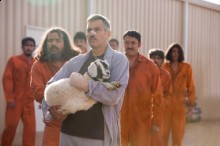
The mainstream itself has at least a couple of tantalizing prospects hitting town on Friday, with Richard Kelly’s The Box and Grant Heslov’s The Men Who Stare at Goats. The former should be of particular interest to admirers of Kelly’s Donnie Darko (2001), though this looks to be at least a little more mainstream (in part to counteract the negative fallout from his last film, Southland Tales, which set disappearance records in 2006).
In addition to having one of the great titles of all time, The Men Who Stare at Goats boasts a terrific cast—George Clooney, Ewan McGregor, Jeff Bridges, Kevin Spacey—and a delightfully screwy premise about training men with paranormal abilities as a “new kind of warfare.” None too surprisingly, the whole thing is based on a true story. The trailer looks good, and with any luck, the film itself will live up to it.
Far less promising are The Fourth Kind and A Christmas Carol. The Fourth Kind looks to be a bottom-of-the-barrel fact-based affair of the usual proctologists-from-outer-space alien-abduction school. It also looks as though it uses its faux-documentary approach as an excuse for a dreary-looking movie in the name of “realism.” Perhaps it will prove my suspicions unfounded, but I harbor grave doubts.

It’s probably telling that the posters for A Christmas Carol tout neither the name of the filmmaker, Robert Zemeckis, nor that of the author of the source book, Charles Dickens. Instead, it offers us the brand name Walt Disney. Perhaps they heard the possibly apocryphal story about the original credits for the 1935 film of Dickens’ David Copperfield having inadvertently omitted all reference to Dickens—a situation that sent MGM execs into a panic till they realized that Dickens was dead and in no position to sue them for the oversight. (The credits were amended before general release, in any case.) Regardless, it’s obvious from the film’s trailers that this is very Disneyfied—not to mention highly Zemeckised and awash in more Jim Carrey than the average mind would care to contemplate (he’s credited with eight voice parts). Dickens’ tale has survived much—even Mr. Magoo—but whether it can survive an effects-driven 3-D extravaganza remains to be seen.
On DVD
Not much exciting here, with the mainstream offerings consisting of The Taking of Pelham 123, G.I. Joe:The Rise of Cobra, Aliens in the Attic and I Love You, Beth Cooper, though I’m sure there’s an audience for at least 50 percent of these titles.
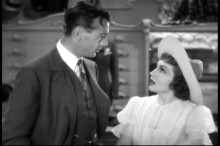
The cult-and-classics area is a little more interesting, though the question remains as to whether the special 50th anniversary edition of Alfred Hitchcock’s North by Northwest is much more than another way to make film fans buy another copy of a movie they probably already own. (Yes, I know it’s Blu-ray and that may be justification enough.) Of somewhat greater interest to me is the six-film set of Claudette Colbert movies that’s just out. I’m not sure why anyone would want to watch Maid of Salem (1937) with Colbert and Fred MacMurray somewhat preposterously cast as 17th century folks caught in the infamous witch trials, but it’s nice to see Ernst Lubitsch’s often overlooked Bluebeard’s Eighth Wife (1938) getting a DVD incarnation. Almost equally pleasant is the release of the all-but-forgotten Mitchell Leisen comedy No Time for Love (1943). The inclusion of Three-Cornered Moon (1933) and I Met Him in Paris (1937) has the personal bonus for me of being films I’ve never seen. (Yes, such things still exist).
Notable TV screenings
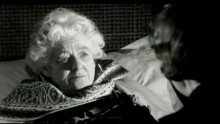
Murder at the Gallop Sunday, Nov. 8, 6:30 a.m., TCM
No, Margaret Rutherford isn’t the ideal embodiment of Agatha Christie’s sleuth Miss Marple. In fact, Dame Agatha positively loathed her in the role, had no use for the four films where she played the character, and was delighted when the final film, Murder Ahoy (1964), didn’t even bother using one of her books for source material. All that to one side, the films themselves are enjoyable comedic mysteries, and Rutherford is such an irresistible old scene stealer that you probably won’t mind the lack of faithfulness to Christie’s books. The second film in the series, Murder at the Gallop (1963), is generally considered to be the best, though I’ll admit a slight preference for Murder Most Foul (1964)—if only for Ron Moody’s performance as a desperate theatrical impresario and Rutherford’s recitation of “Dangerous Dan McGrew.” Nonetheless, Gallop is an engaging little mystery and benefits from the presence of Robert Morley (as all films with Morley do).
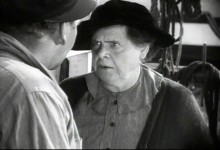
Min and Bill Monday, Nov. 9, 3 p.m., TCM
Had George Hill not died in 1934 (an apparent suicide) chances are he would have gone on to prove himself as one of the very few filmmakers capable of retaining his identity and a personal filmmaking style at the MGM factory. Certainly, the handful of early talkies he made for the studio—The Big House (1930), Min and Bill (1930) and The Secret Six (1931)—suggest that. His films were considerably less stodgy than the studio’s average fair and were marked by their fluid camerawork. The slightest of the three is Min and Bill, a sentimental (and how!) comedy/drama with a tragic ending built around the talents of Marie Dressler and Wallace Beery. Dressler is—as always—a delight as Min, while Beery is held in check by Hill and not allowed much in the way of his usual lovable roughneck antics. The film is held in place mostly by Dressler’s performance in a role that allows her to go from comedy to drama without batting an eye. Her early scenes where she battles with Beery and hits him with lines like, “Yeah, I trust you. You’re too dumb to be anything but honest,” are priceless bits of comedy, but they don’t prepare you for the dramatic parts, which are among the most effective of Dressler’s career. Hill keeps it all in check and keeps it moving at a good pace, while getting the most out of the story’s seedy waterfront setting.
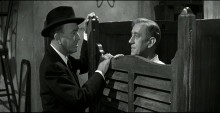
Our Man in Havana Monday, Nov. 9, 10:30 p.m., TCM
Carol Reed’s 1960 political comedy Our Man in Havana is a film that has never quite gotten the attention it deserves. That’s hard to understand, because this deliciously sly film is marvelously entertaining. Alec Guinness plays a hard-up vacuum-cleaner salesman who accepts an offer from secret-service operative Noel Coward to do a bit of spying for the British government. The plot mostly revolves around Guinness’ discovery that he can make up anything—even agents—and send them and a bill to London and get paid for it. The problem comes when real life intrudes and his bogus reports start being taken seriously by the pre-revolution Cuban government. (Much of the plot is strikingly similar to that of John Boorman’s 2001 film The Tailor of Panama, which would make a great second feature to this.) The film benefits from actually being shot in Havana and a splendid supporting cast that not only includes Coward, but Maureen O’Hara, Ernic Kovacs, Burl Ives (unbelievably good) and Ralph Richardson.




Jim Carrey loose in a Disney Christmas Carol? (Full body shudder) Is nothing sacred? Wasn’t raping Grinch enough for them? I’m aghast. I can’t wait to read the review though. Would you write it Ken? Pretty please? Pretty please with sugar on it?
Motion-capture C.G.I. frankly terrifies me. I’ve heard some people describe as photorealistic. I’ll give them the benefit of the doubt and assume that they hail from a reality of planar surfaces and incongruously warm lightning whose inhabitants constantly wear cellophane masks and duct-tape wooden dowels to their limbs.
I can’t wait to read the review though. Would you write it Ken?
I am doing this one — I hadn’t the heart to make Justin do it.
Motion-capture C.G.I. frankly terrifies me
Amen. I can think of nothing that looks creepier or more downright nightmarish. To me, it looks like an entire world composed of the Wayans Brothers in White Chicks and Peter Lorre in The Face Behind the Mask.
I’ll give them the benefit of the doubt and assume that they hail from a reality of planar surfaces and incongruously warm lightning whose inhabitants constantly wear cellophane masks and duct-tape wooden dowels to their limbs.
That’s got all the makings of a damn fine horror movie.
I can just see it now: A sweet and innocent couple makes a wrong turn while taking the ‘scenic route’ through the countryside, on the way to their anticipated vacation destination. As the sun slowly begins to set, the wife begins to panic, realizing that they are lost in the middle of nowhere. The husband, of course, refuses to admit that they’re lost, as he stares intently down the road, veering deeper and deeper into the wild, dark and menacing wilderness. Suddenly the car starts to sputter and smoke for some unknown reason, until it finally quits running altogether. Now they are forced to walk on foot. And under the dire stress of their predicament, they begin to argue. The wife, in a fit of hysterics, accuses her husband (who is obviously now viewed as stupid) of not paying attention, among other foolish mistakes. THEN, out of nowhere, they come across a spot where they can see a quaint looking little village, with a few dwindling rays of warm sunlight beaming down, not too far off in the distance. They give a sigh of relief as they stumble up to the local Inn for the night. Little do they know that things are not what they seem, and reality is deceptive…
Eeek.
That’s got all the makings of a damn fine horror movie
That’s exactly how I felt about The Polar Express.
That’s exactly how I felt about The Polar Express.
What on earth is creepy about a mysterious ghost train that appears in the middle of the night to pick up innocent little kiddies, give them delicious hot coco, and fill their gullible minds with magical tales, all the while whisking them away to some far away land that no adult knows about, where slave labor is enforced on little people?
…and parents wonder why kids get abducted most often at magical places like Disney World.
All of the eyes of the characters in The Polar Express appear to have been captured from Dramatic Cupcake Dog. http://www.youtube.com/watch?v=t-XIMEHGoZI&feature=PlayList&p=3D3EC7388391E241&playnext=1&playnext_from=PL&index=28
Well, I’ve put off seeing A Christmas Carol so far, but tomorrow I have no choice but to tackle it…
Courage, Camille.
a poem, by piffy–
i hate
jim carrey
very much
And yet Jim Carrey is far from the worst thing about the movie. I will say no more at this point.